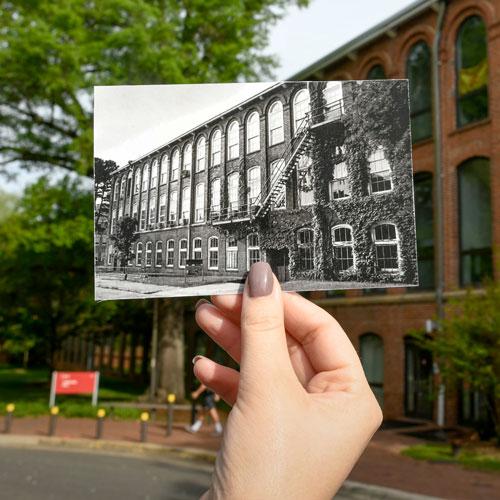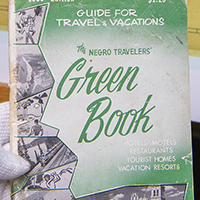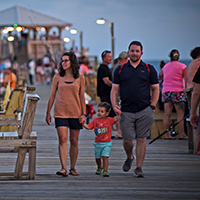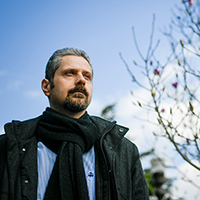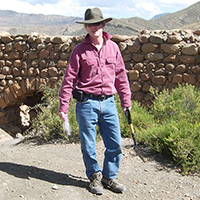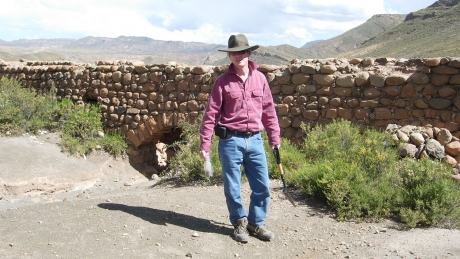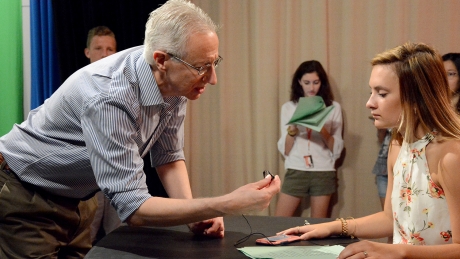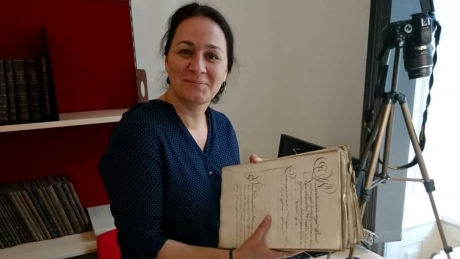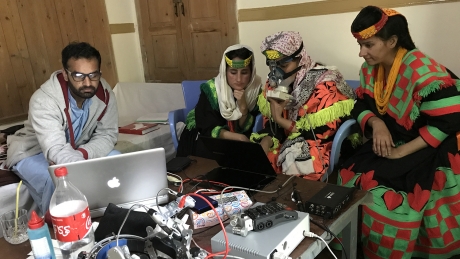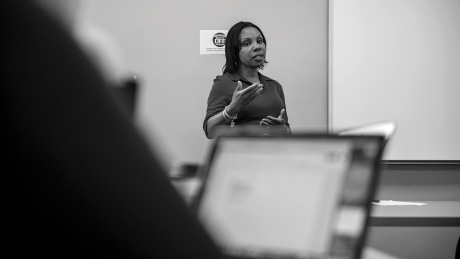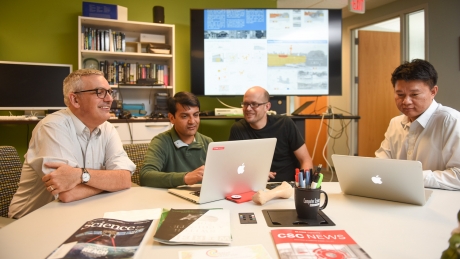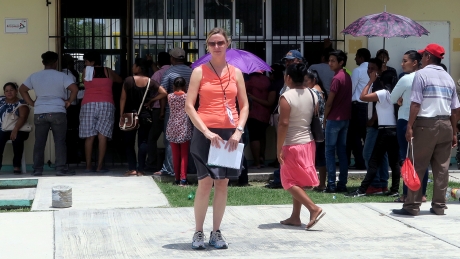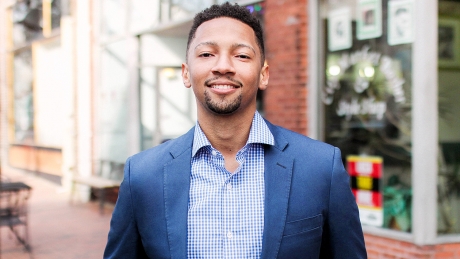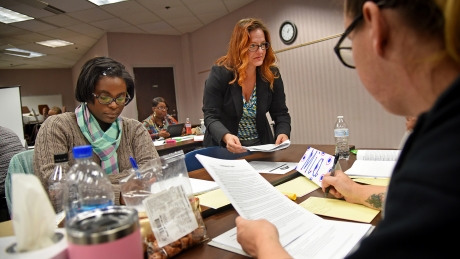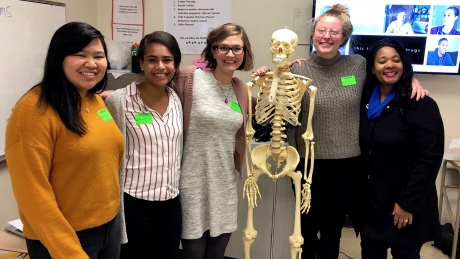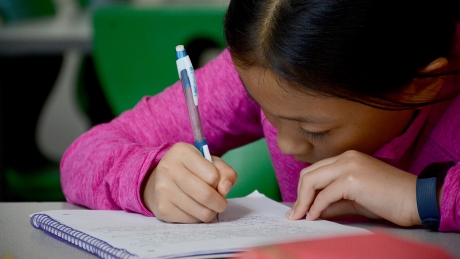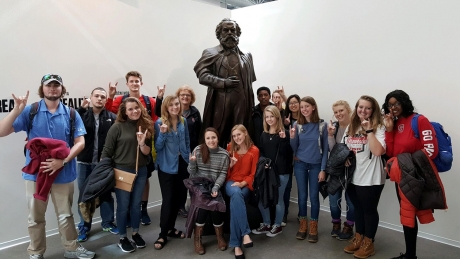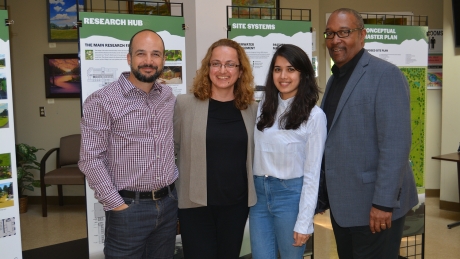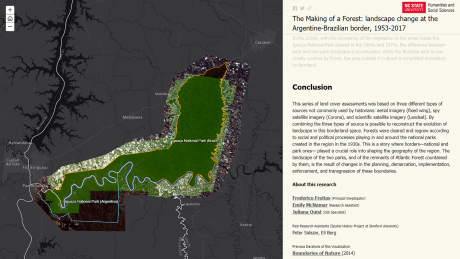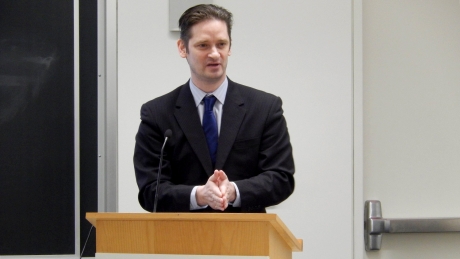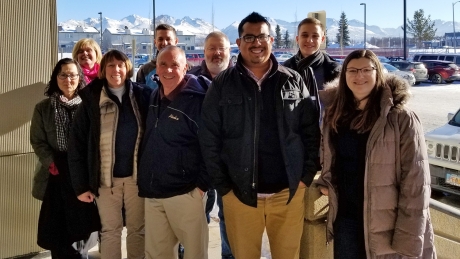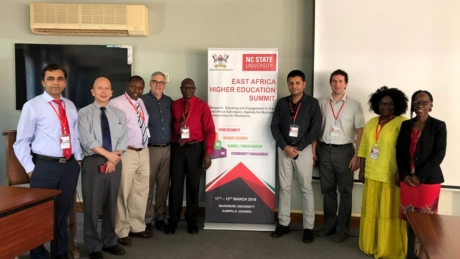Expertsin Action
Our college has experts in topics ranging from environmental policy to aging, teen health and economic development, to name just a few areas.
As this photo gallery demonstrates, their diverse research and engagement efforts share a common theme: they grapple with issues and help address society’s grand challenges. Explore some of their work in action.
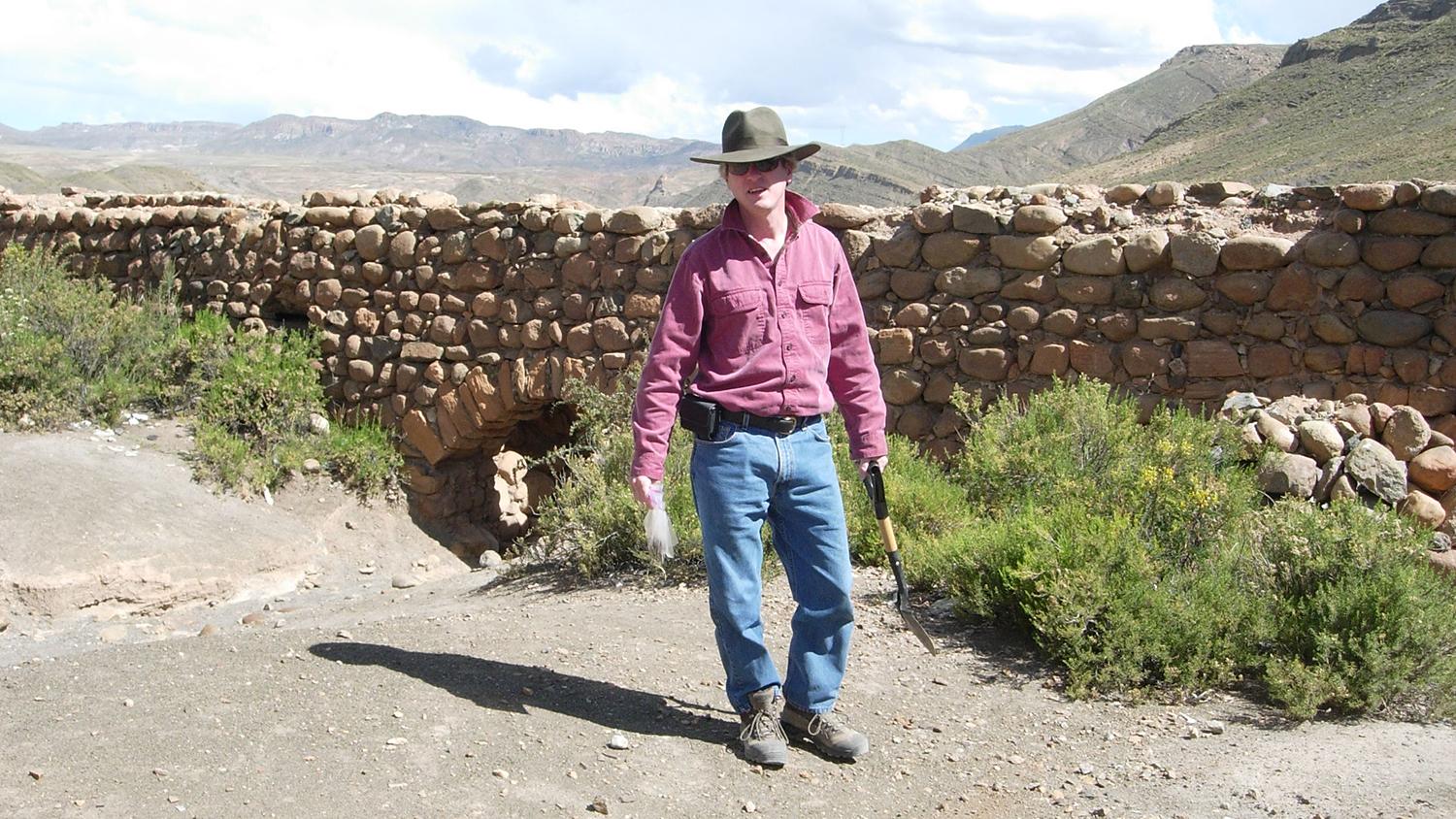
Through their research and engagement efforts, our faculty make a real and measurable impact. Here, History professor Nicholas A. Robins conducts research on heavy metals soil contamination in Potosí, Bolivia.
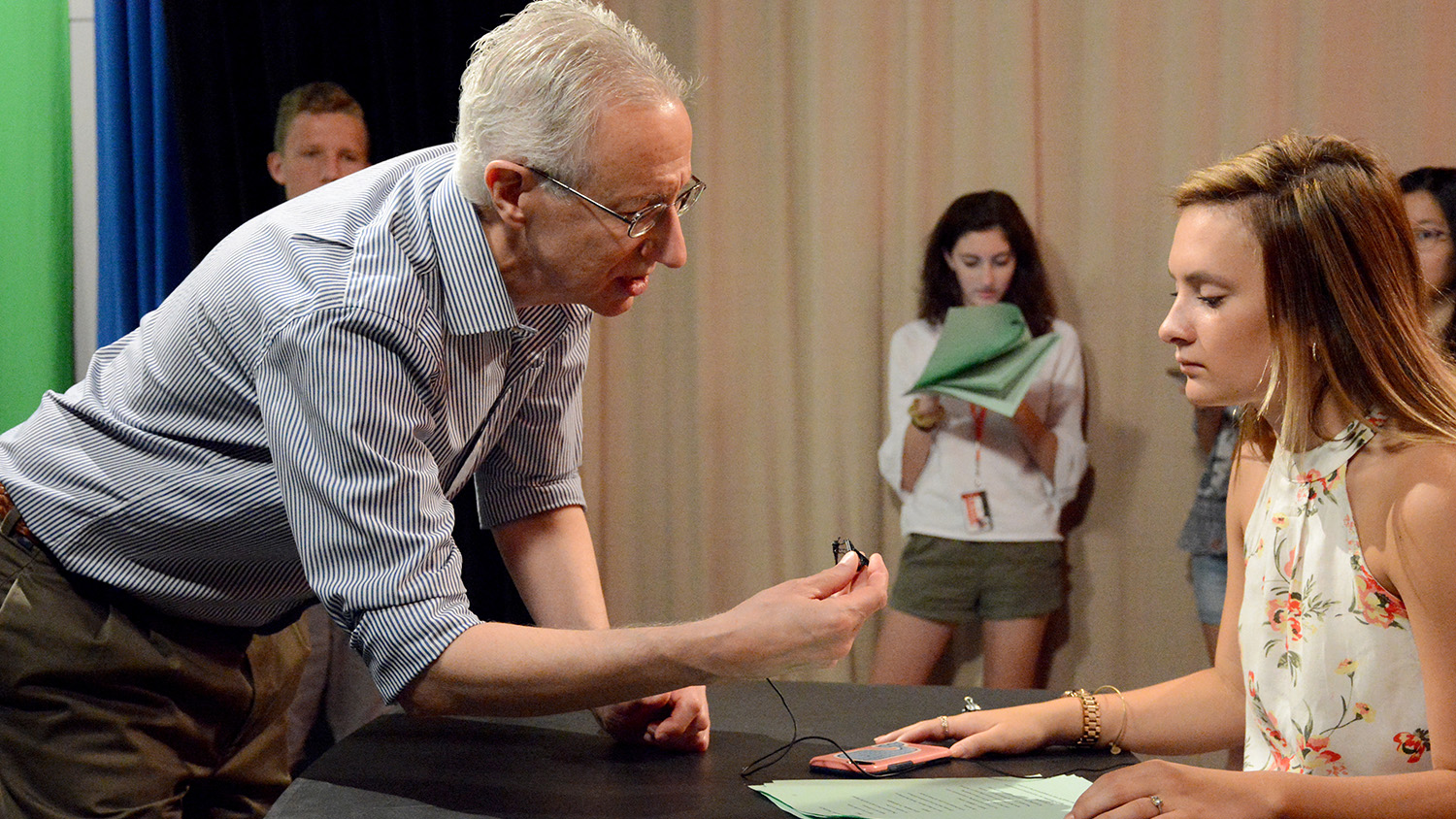
Each summer, NC State's Communication Summer Camp allows high school juniors and seniors to test their TV production and broadcasting skills in an authentic studio environment. Led by Department of Communication faculty Jim Alchediak and Dean Phillips, the camp gives students an opportunity to learn and practice news anchoring and reporting, studio operation, live broadcasting and other techniques. Throughout the week, students work together to produce 15-minute newscasts, which they present to their parents and families on the last day of camp. Here, Alchediak discusses the capabilities of a lavalier microphone.
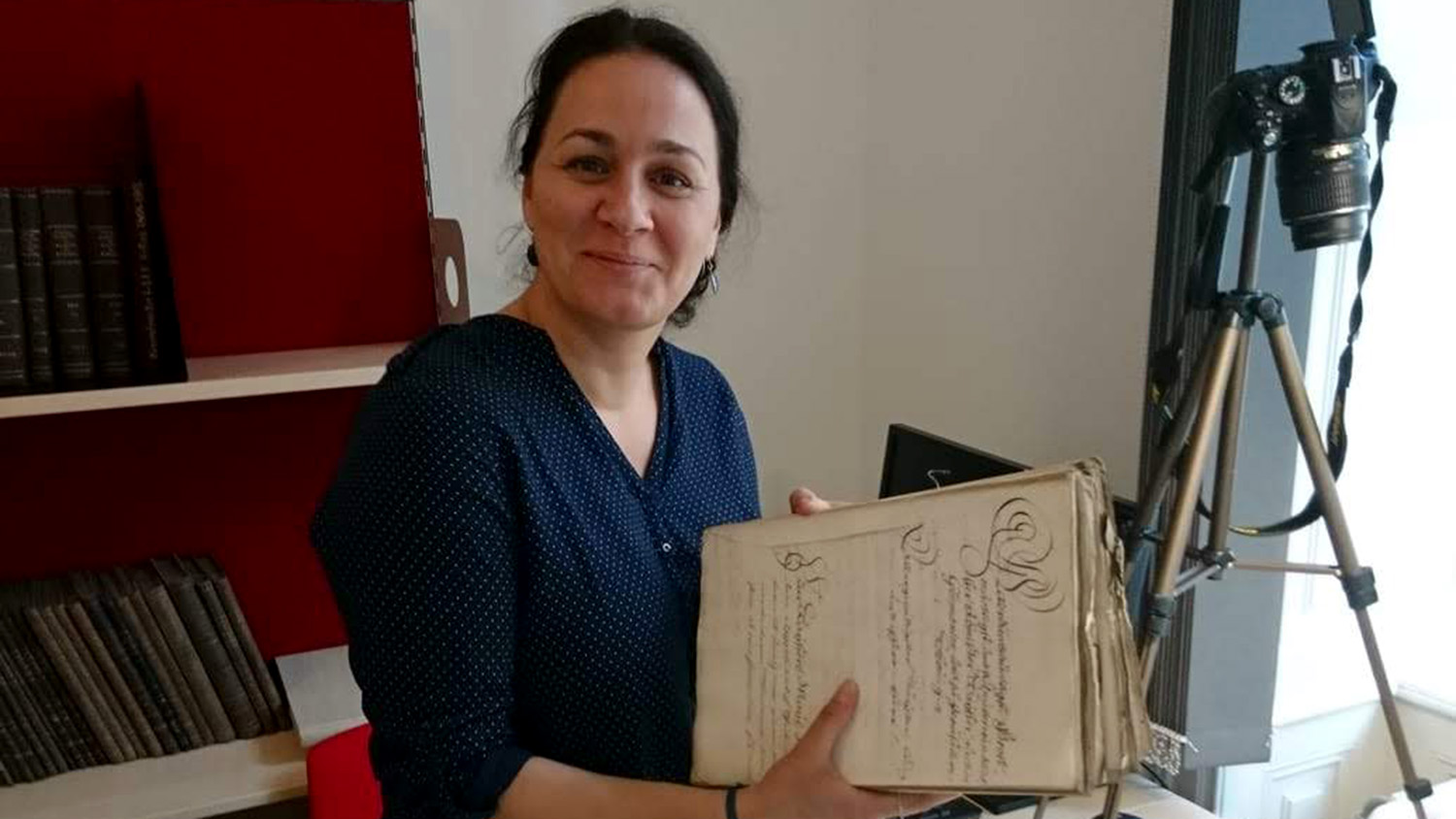
History professor Verena Kasper-Marienberg is a Eurias/Marie Curie fellow at the Israel Institute of Advanced Studies in Jerusalem. She is researching sources on early modern Jewish communities in archives in Frankfurt, Vienna and Jerusalem. Digitizing archival material, like the 18th century imperial court files she is holding in her hands in this image, is part of the work and will allow her to bring her research to NC State.
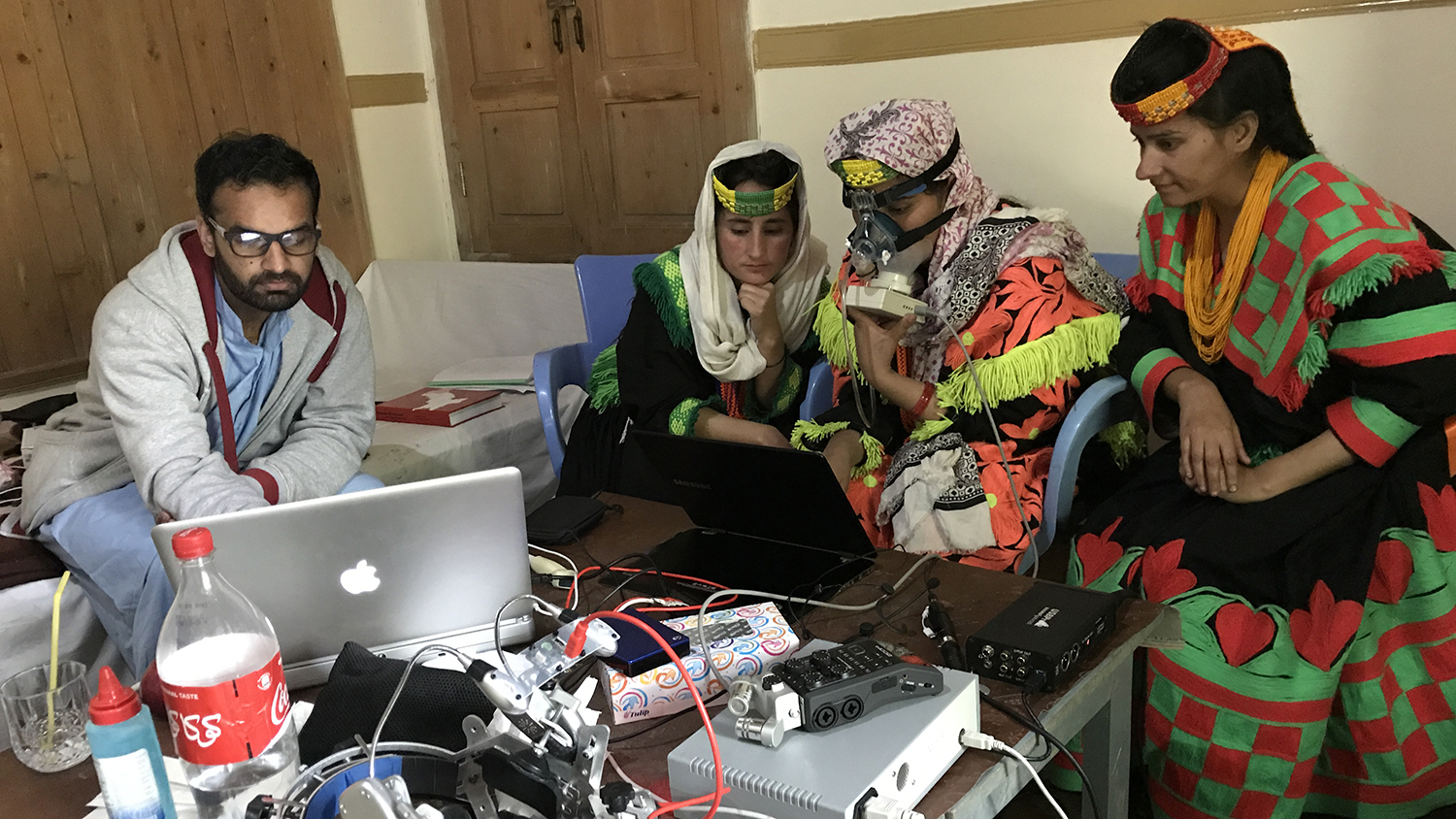
UNESCO has declared 2019 as the International Year of Indigenous Languages. Qandeel Hussain, a postdoctoral research scholar in the Department of English, conducts research on the endangered languages of Northern Pakistan. Here, he is making airflow recordings of a Kalasha speaker. This work is part of a National Science Foundation-funded project led by English professor Jeff Mielke to document Kalasha, an endangered Indo-Aryan language.
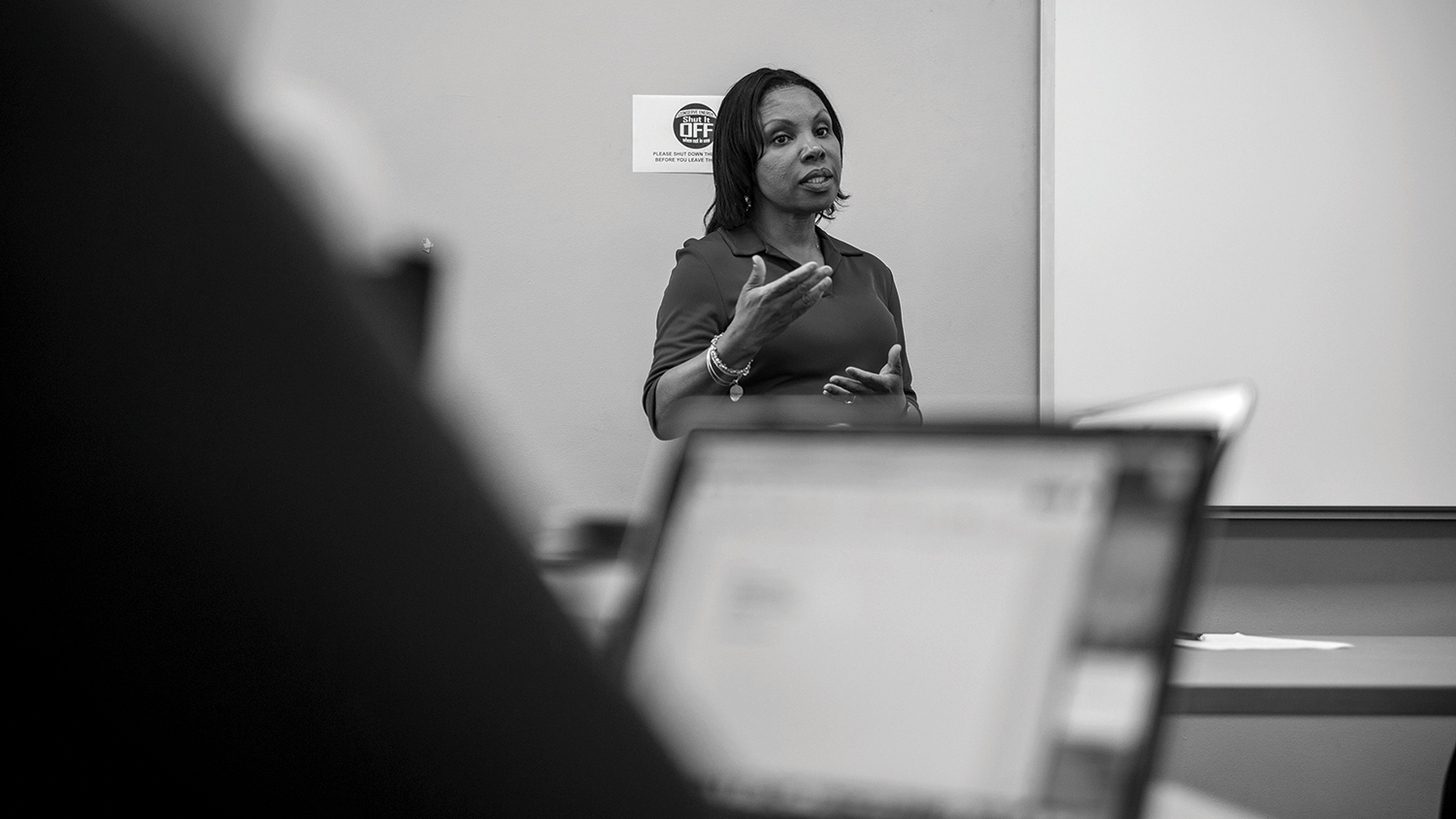
In Introduction to Gerontology, Social Work Department Head Karen Bullock leads her students out of the classroom into retirement communities, adult day care centers and skilled nursing facilities around Raleigh for high-impact learning. The course is designed for students to have hands-on experiences that challenge the myths and realities of aging and innovation. At the end of their time in the field, the students return to the classroom and present a practice innovation that can change the way we approach gerontology in the future. Photo credit: Bryan Regan and NC State magazine.
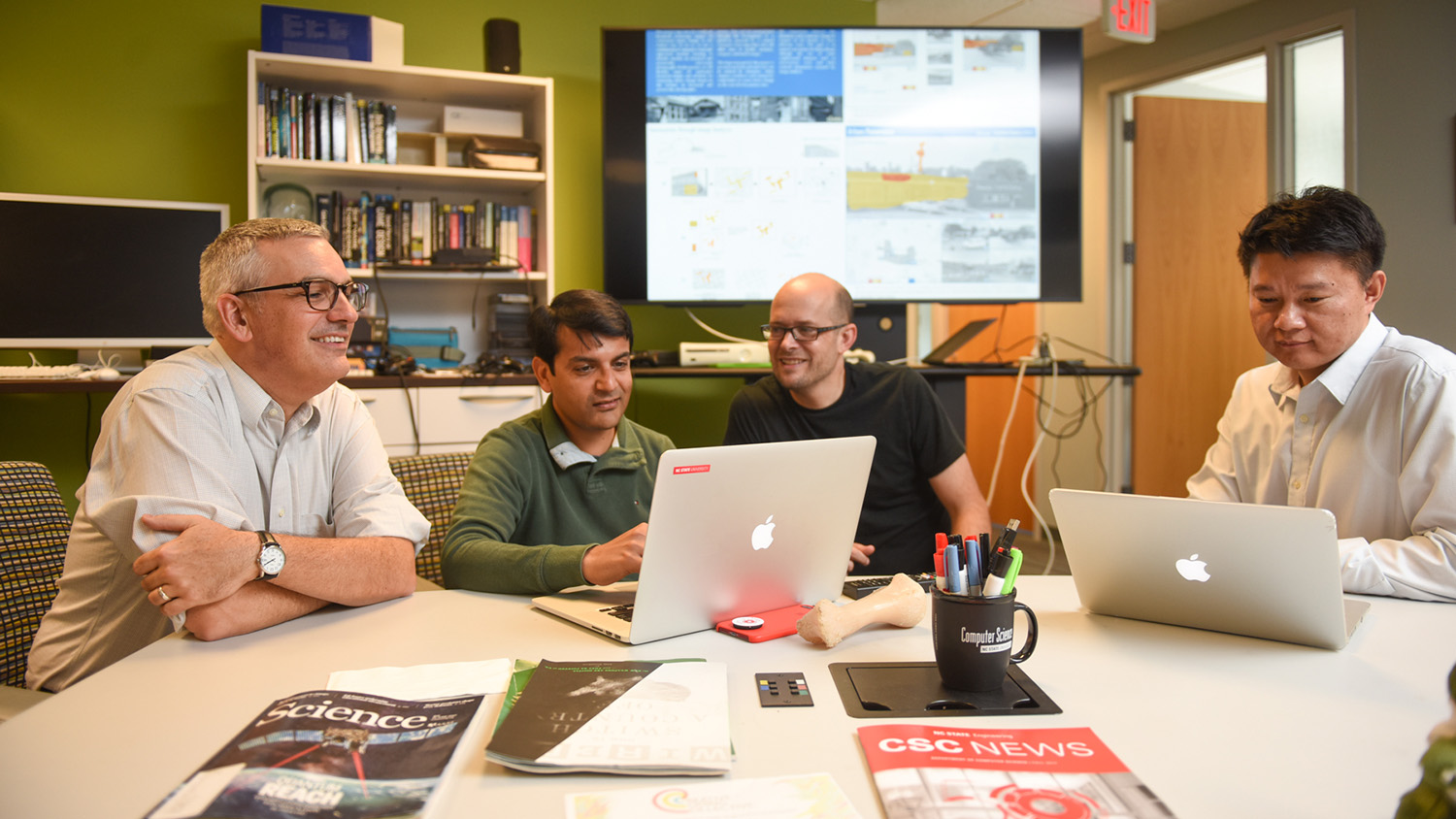
Our college is a key stakeholder in NC State's Visual Narrative Initiative, a faculty cluster consisting of humanists, computer scientists, designers and engineers. The group is collaborating with Stanford University using artificial intelligence, computer vision and machine learning to analyze images of city streetscapes before, during and after the Great Depression of the 1930s and the Great Recession from 2009-2012 to understand how these crises affected the urban landscape. The cluster's goal is to create methods and tools that can be utilized by geographers, urban scholars, historians, architects, and community stakeholders to assess urban change at the street level in modern cities. Pictured (l to r) are Matthew Booker, associate professor of history; Arnav Jhala, associate professor of computer science; Todd Berreth, assistant professor of art and design; and Tianfu (Matt) Wu, assistant professor of electrical and computer engineering.
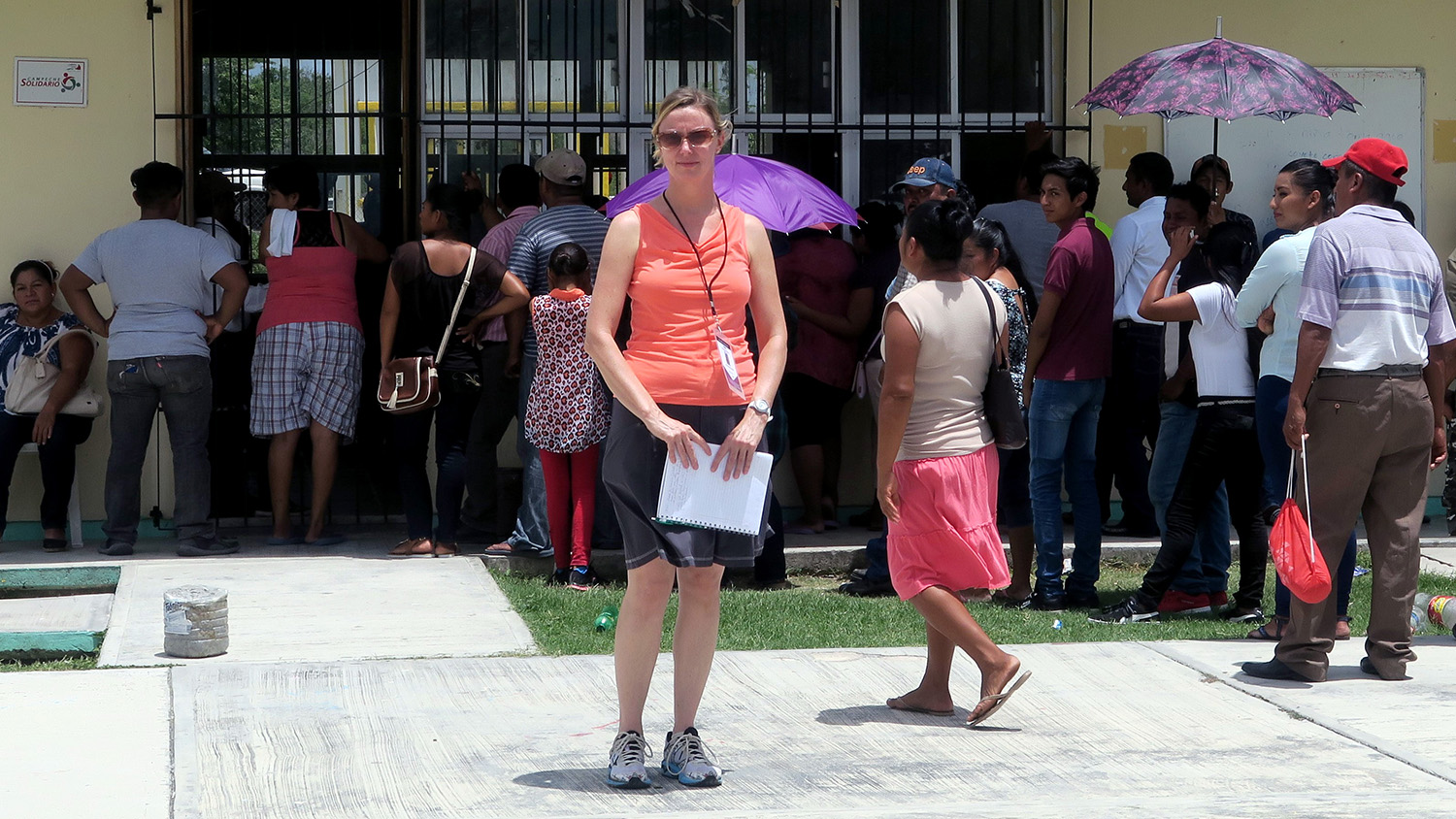
Our faculty extend their expertise beyond borders. During a recent summer, anthropologist Nora Haenn served as an observer of Mexico's national elections through the University and Citizen Network for Democracy. "I carried out my observations in a part of the country where I have been conducting fieldwork for 25 years," Haenn said. "Watching another country’s democratic process was incredibly inspiring. It was also a great way to give back to a community that has given so much to me. Above all, I was impressed by the level of citizen engagement I witnessed."
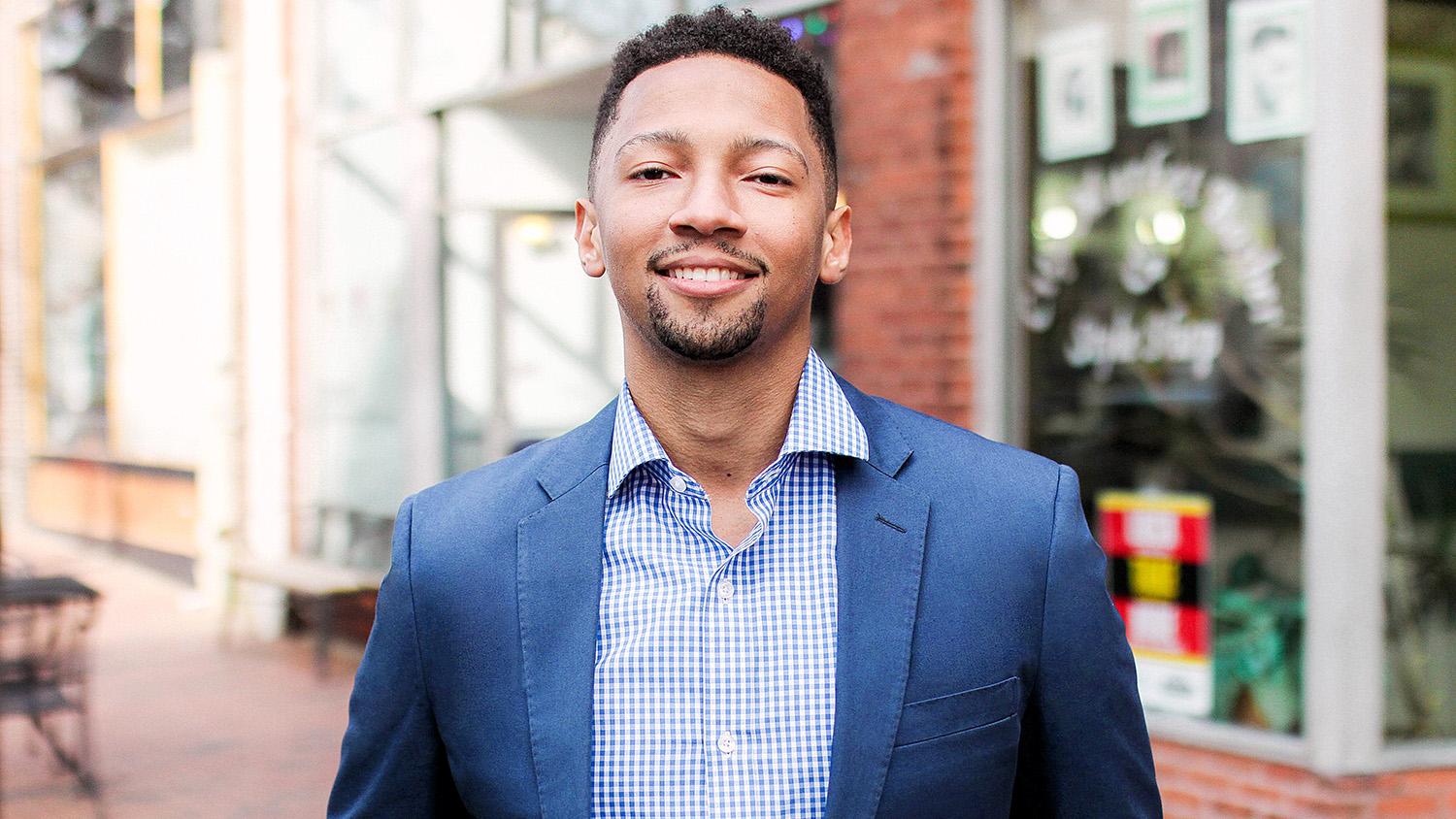
In addition to his research in metaphysics and philosophy of language, professor Kevin Richardson has a passion for promoting diversity in academia. At the American Philosophical Association, he's a member of the Committee on the Status of Black Philosophers and the Diversity Institute Advisory Panel. He also co-founded the Philosophy in an Inclusive Key Institute at Boston, a summer institute for underrepresented minorities who are considering going to graduate school for philosophy. At NC State, RIchardson also works with doctoral students every spring through the Building Future Faculty Program.
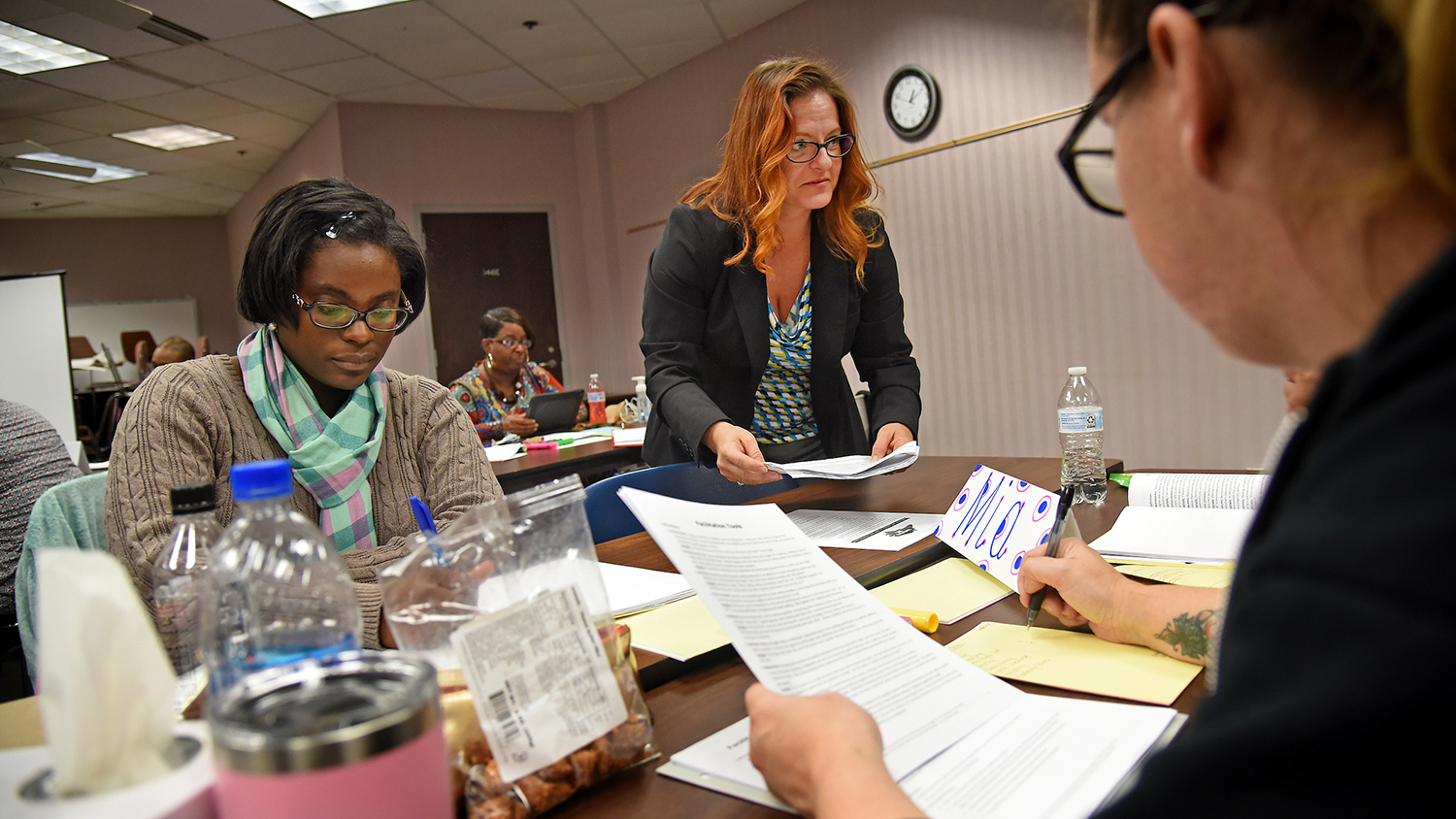
Center for Family and Community Engagement training coordinator Jenny King (center) sets up group project work during a class called "Navigating Child and Family Teams: The Role of the Facilitator" at the Pitt County Department of Social Services in Greenville. This training was funded by the North Carolina Division of Social Services. The center, which is housed in our college, fosters family/community/academic partnerships to promote family and community health and well-being. The center works with partners locally, nationally and around the world to support community engagement, provide training and technical assistance and conduct research and evaluation.
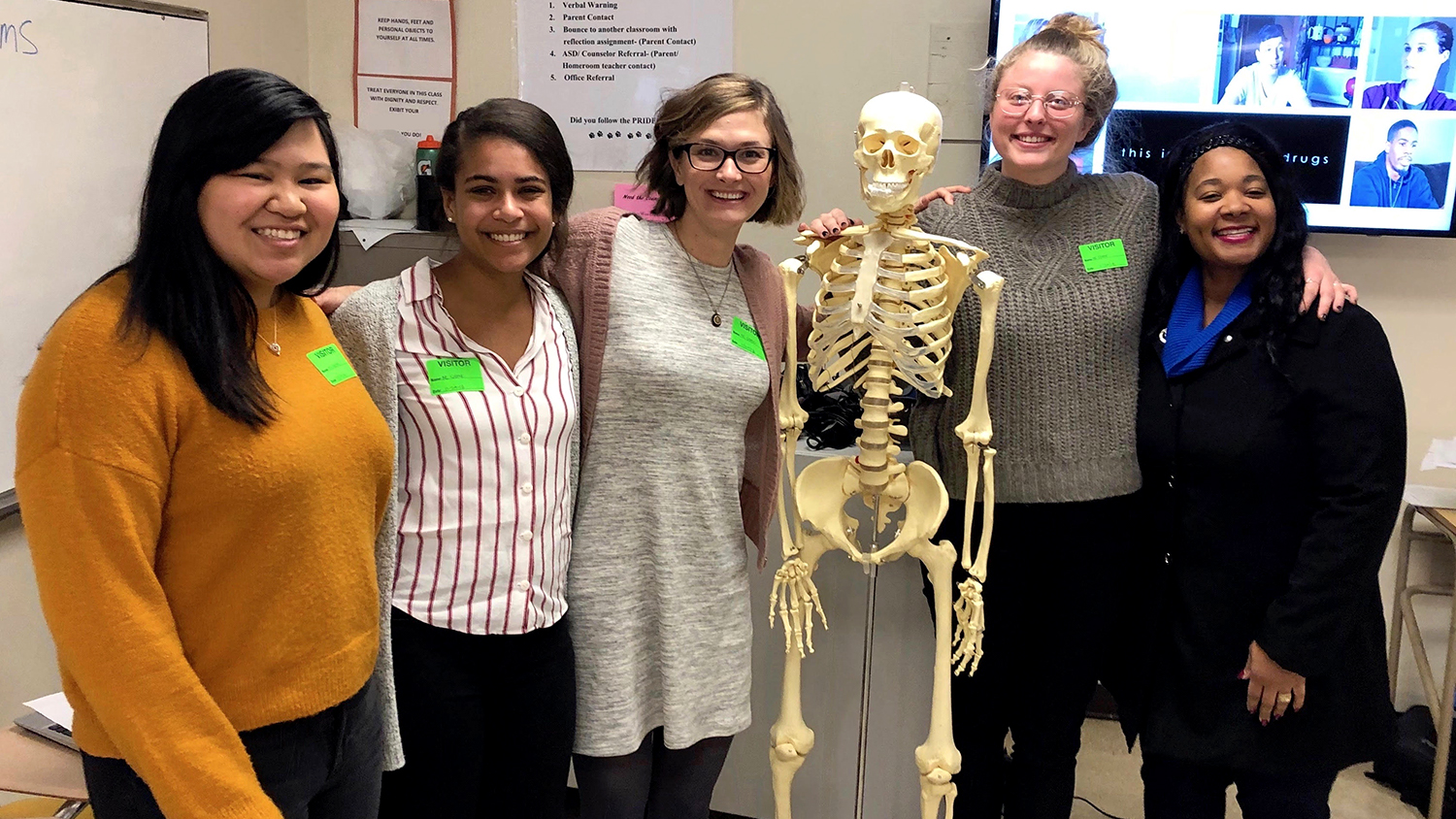
Psychology professor Laura Widman's Teen Health Research Lab has been partnering with a local school district to offer an opioid prevention program to all 7th graders in the district. This photo shows several team members in the classroom at the end of a session. Pictured (l to r) are Gabbie Consing, Chantelle Linthicum, Elizabeth Adams, Reina Evans and Claudia Kearney. The project is funded with support from the Center for Family and Community Engagement, NC TraCS, the Department of Psychology and the College of Humanities and Social Sciences.
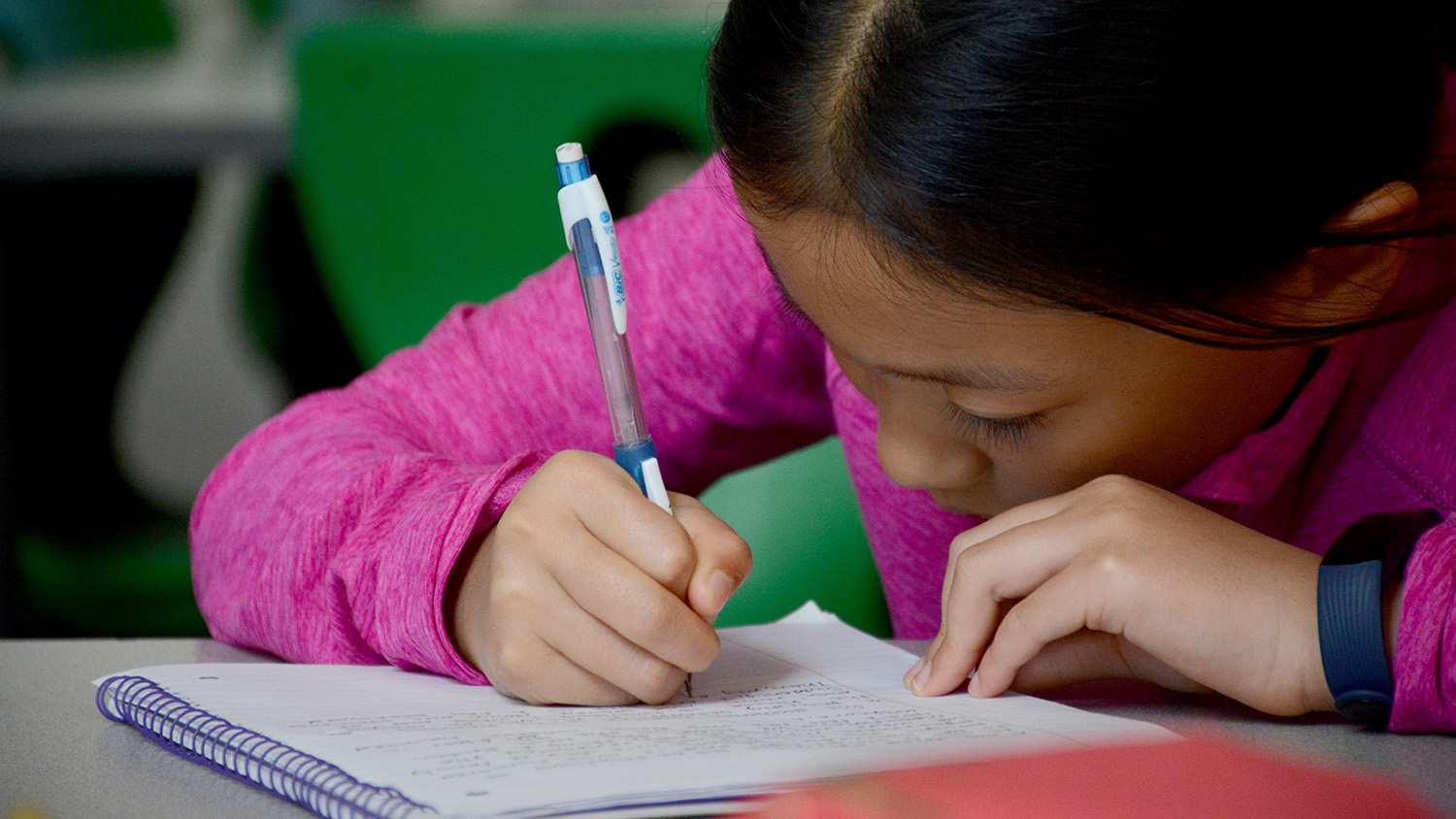
Each summer, NC State’s Young and Teen Writers’ Workshops foster a community for creative writers. Sponsored by our English department, these two-week summer workshops offer aspiring young writers courses in poetry, prose, graphic novels, dramatic writing, creative nonfiction and other genres. Students ages 9-19 develop various pieces throughout the workshop and present their work at reading events for families and friends.
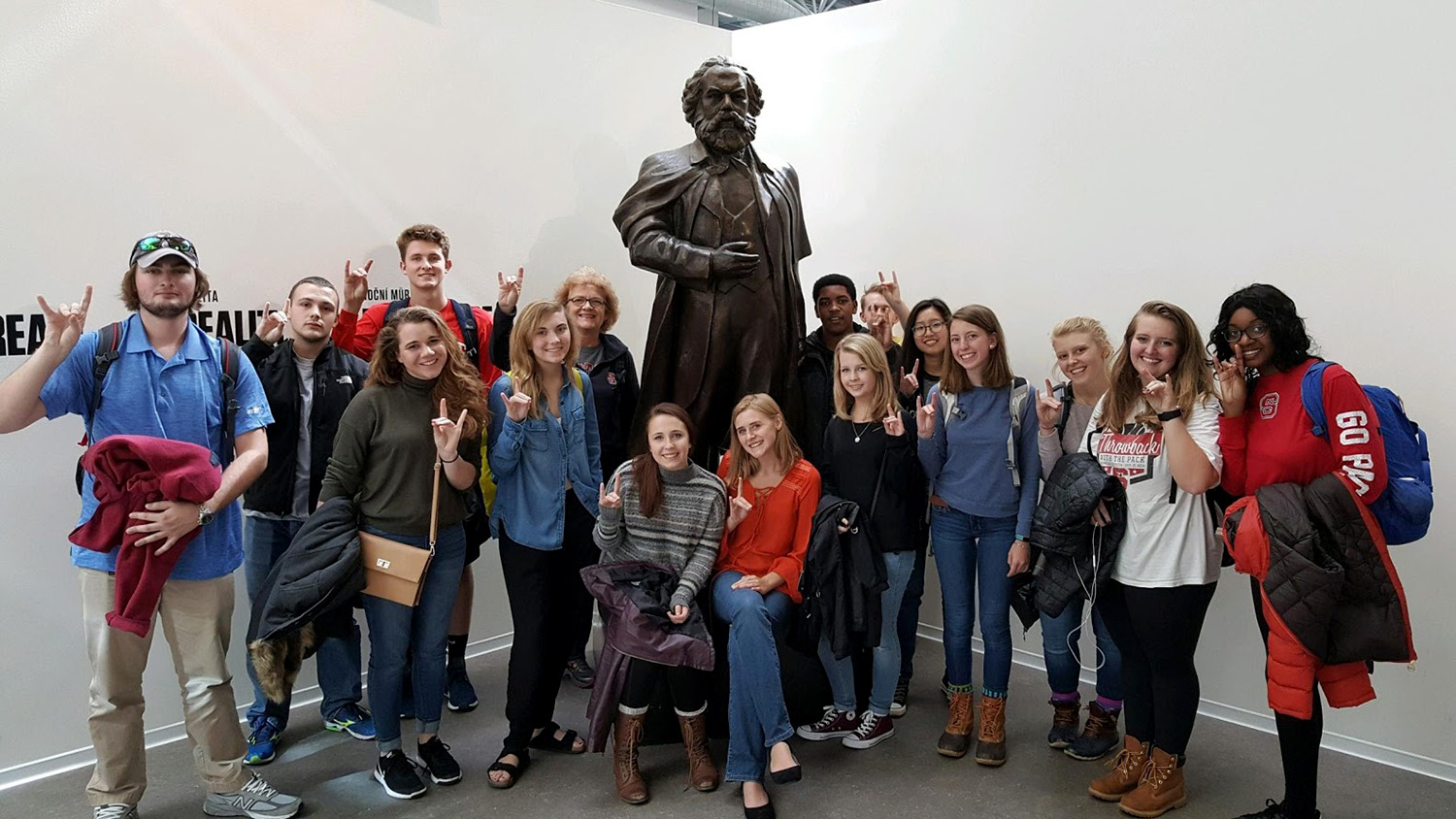
As a Fulbright recipient and as interim director of the NC State European Center in Prague, Heidi Hobbs helped facilitate the Prague Connect program that helps first semester NC State students get an early start on coursework and experiential learning. Hobbs is seen here (back row, left of statue) with the first class of Prague Connect students in Fall 2017 at the Museum of Communism.
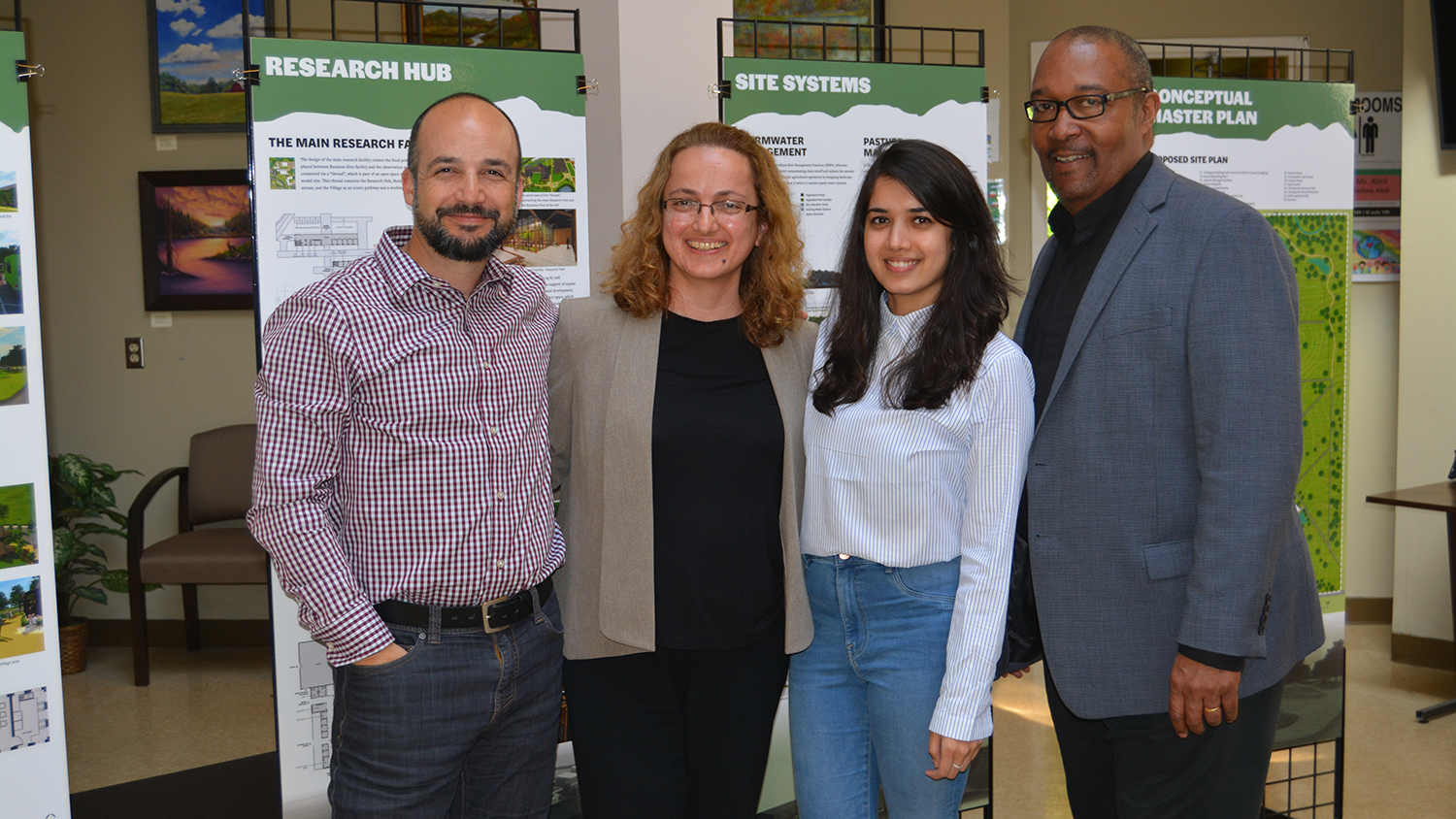
Psychology professor Kwesi Brookins (right) helped lead the Southeast Equine Research and Education Partnership (SEREP), a community-university engagement project in the Isothermal region of Western North Carolina. It was designed to develop an equitable, inclusive and sustainable community and economic development model where community members, private industries and local and regional academic institutions can work in partnership on enhancing the regional equine-based economy. Here, Brookins is pictured with NC State SEREP team members (l to r) Duarte Morais (College of Natural Resources), Celen Pasalar (College of Design) and Pankti Trivedi (College of Design), at the group's final public presentation for the project.
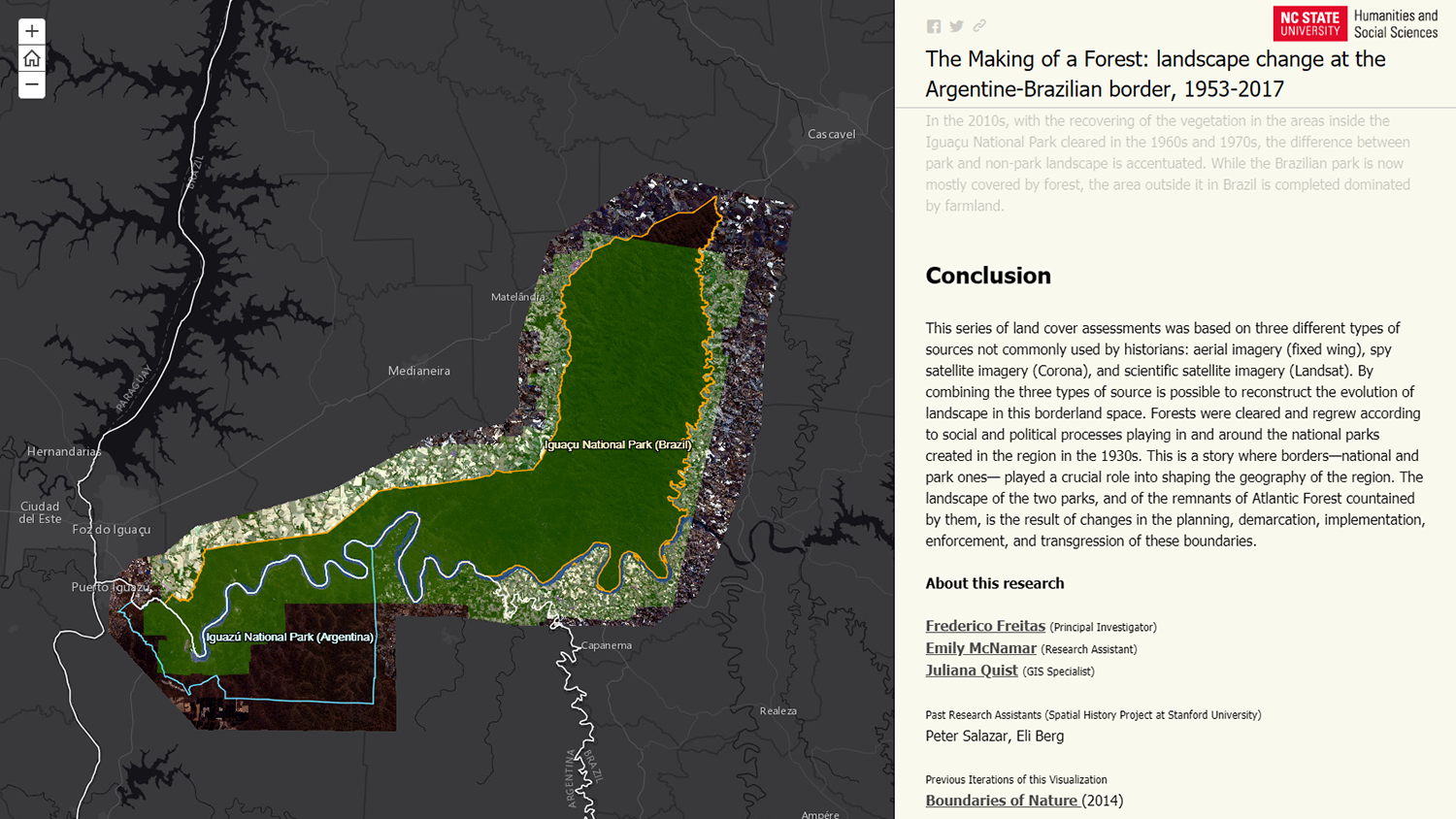
This screen capture is from "The Making of a Forest," a digital humanities project that leverages aerial and satellite imagery to explore the transformation of the borderlands between Argentina, Brazil and Paraguay from 1953 to 2017. The project is led by history professor Frederico Freitas, whose research focuses on the history of Latin America in the 19th and 20th centuries.
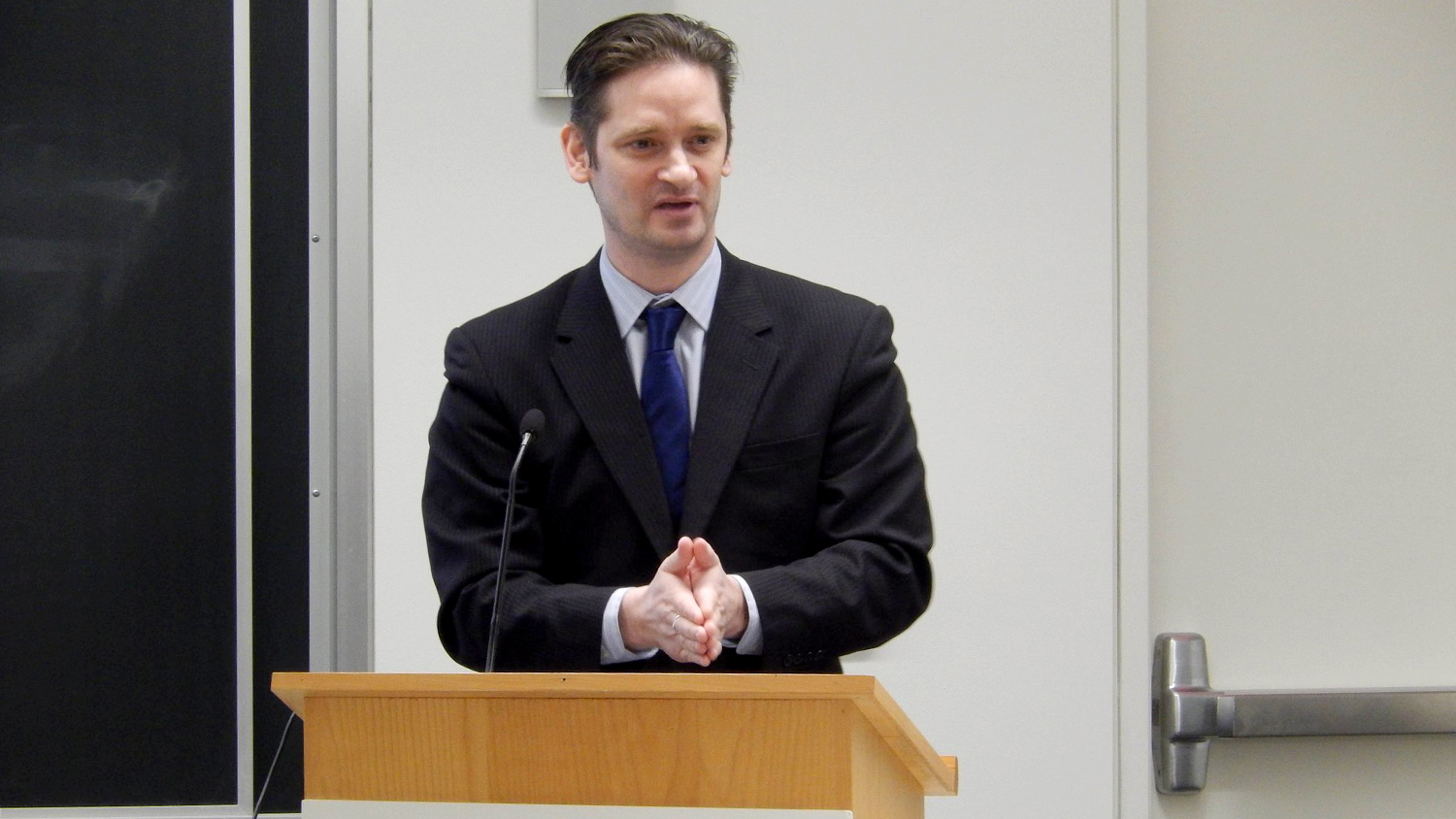
Levi McLaughlin, associate professor of religious studies, presented on religion and politics in Japan at Harvard University's Program on U.S.-Japan Relations, March 5, 2019. McLaughlin recently published Soka Gakkai's Human Revolution: The Rise of a Mimetic Nation in Modern Japan (University of Hawai`i Press, 2019), based on his nearly two decades of field research on this politically active lay Buddhist organization. He's spending most of the 2018-19 academic year back in Japan, continuing his fieldwork, thanks to a fellowship from the Luce Foundation and the American Council of Learned Societies.
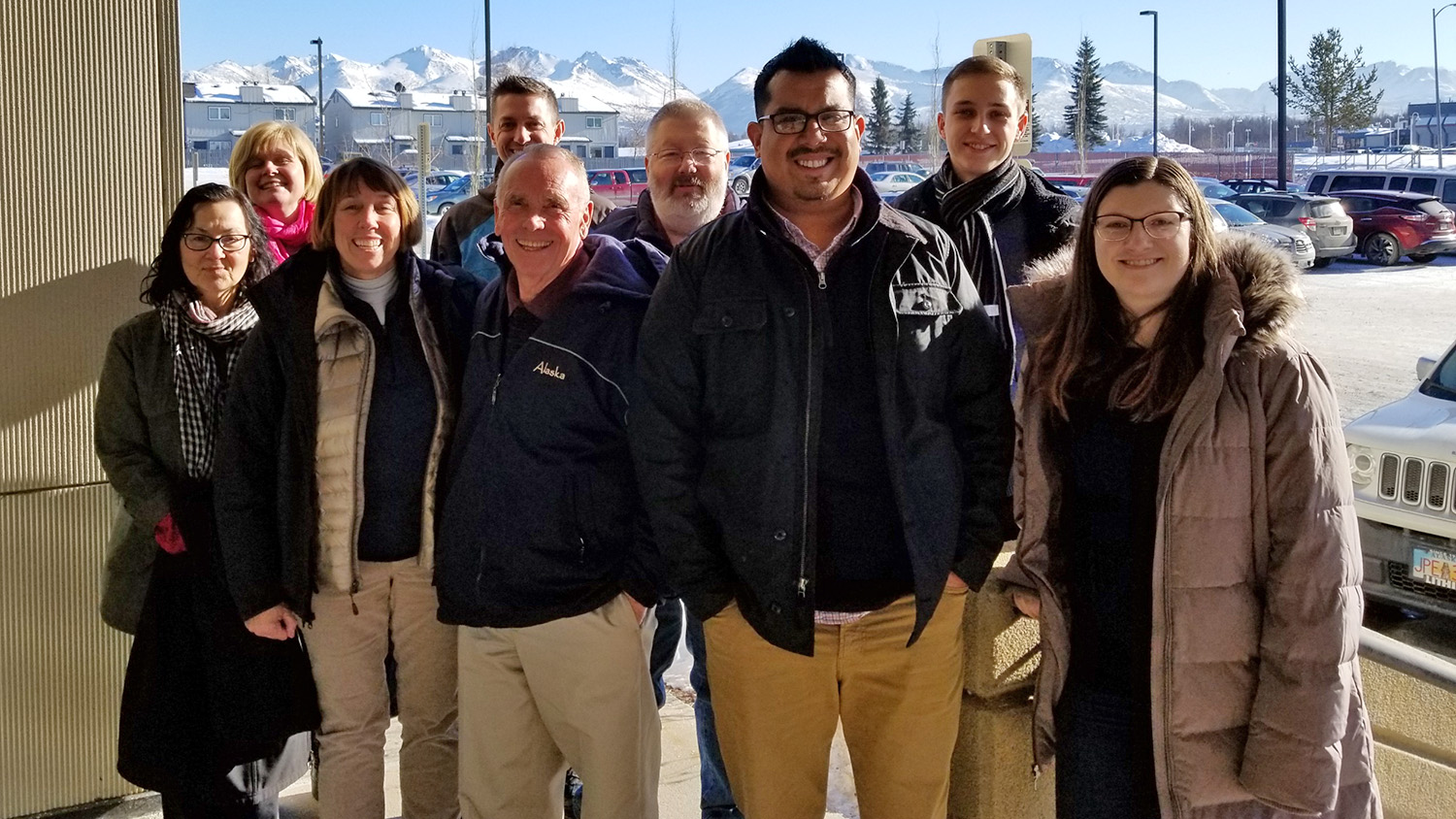
Public administration professor Tom Birkland serves on the research team for the Emergency Response in the Arctic project, a multi-institutional, interdisciplinary initiative that explores how to better prepare for coastal and maritime emergencies as climate change affects communities in the Alaskan Arctic. The research team met at the Institute for Social and Economic Research at the University of Alaska, Anchorage (UAA) on Feb. 28, 2019. Pictured (l to r) are Suzanne Sharp, UAA; Marie Lowe, UAA; Martha Grabowski, Rensselear Polytechnic Institute (RPI) and LeMoyne College; Tom Sharkey, RPI; Al Wallace, RPI; Tom Birkland, NC State; Daniel Jimenez, University of Texas at San Antonio; Jakub Kulakowski, LeMoyne College; and Katy Schwaeble, NC State.
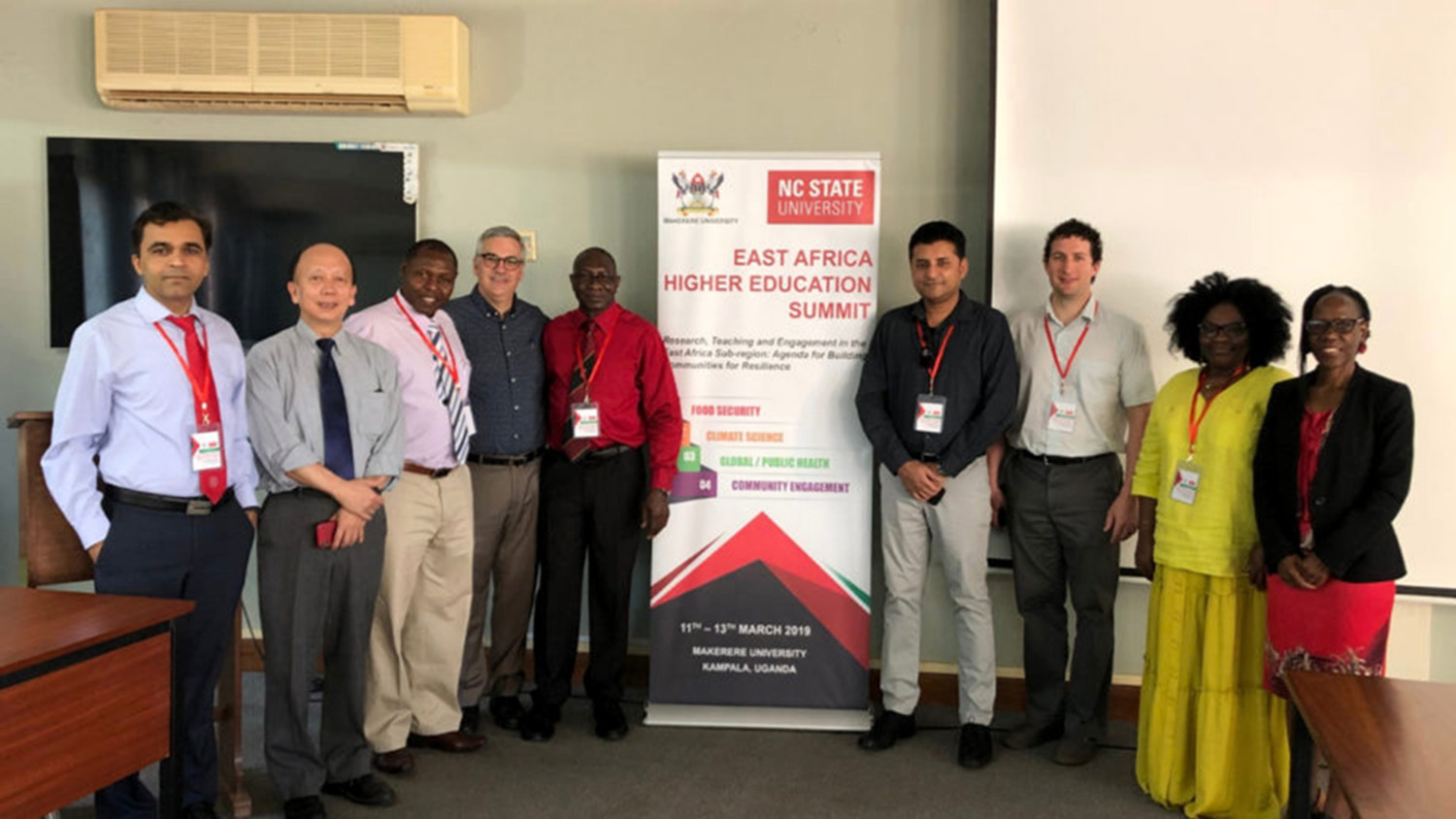
In March 2019, NC State and Makerere University came together in Uganda for the East Africa Higher Education Summit. Several Humanities and Social Sciences faculty members traveled to the summit, including James Kiwanuka-Tondo (communication, fifth from left), Matthew Booker (history, fourth from left) and Juliana Nfah-Abbenyi (English, second from right). The summit provided a platform for East African universities to discuss the transformation of higher education to support research and economic development, capacity building through partnerships and regional implementation mechanisms.
1 of 17
CATEGORIES: Faculty, Research and Engagement, Spring 2019
